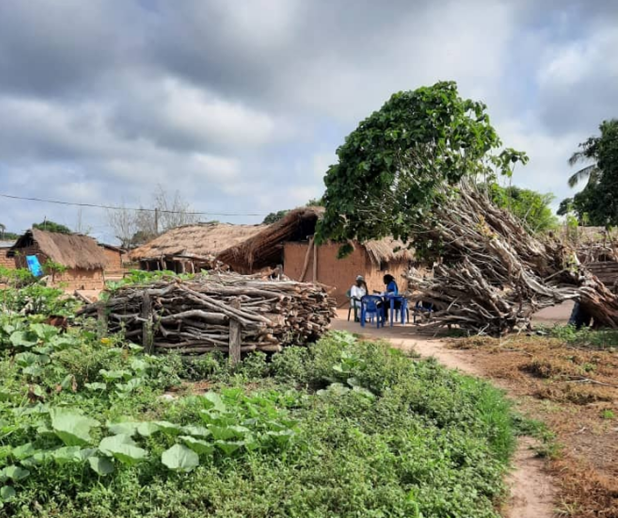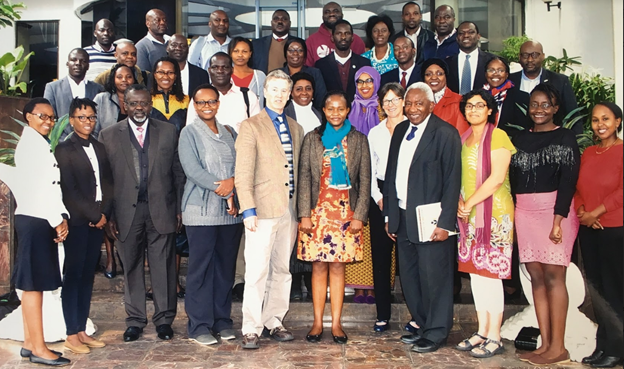Gender and information ecosystems in climate change adaptation

Photo of an interview being conducted during the latest fieldwork stage in Kintampo South, Ghana, June 2021
People employed on project and job titles
Professor Chris Paterson—School of Media and Communications, University of Leeds, UK
Dr Lata Narayanaswamy—School of Politics and International Studies, University of Leeds, UK
Professor Audrey Gadzekpo—Department of Communication Studies, University of Ghana, Ghana
Dr Gilbert Tietaah—Department of Communication Studies, University of Ghana, Ghana
Dr Jacinta Maweu Mwende—Department of Philosophy and Religious Studies, Institute for Climate Change and Adaptation, University of Nairobi, Kenya
Dr Silas Oriaso Odongo—School of Journalism and Mass Communication, University of Nairobi, Kenya
Professor Lee Edwards—Department of Media and Communications, London School of Economics, UK
Project dates
Stage 1: January to July, 2019, with pilot research in Kisumu and Makueni counties, Kenya
Stage 2: January to December, 2020, with pilot research in Kwale county, Kenya and Ada and Savelugu-Nanton districts, Ghana
Stage 3: January to July, 2021, with research in Makueni and Kilifi counties, Kenya and Ada and Kintampo South districts, Ghana
Project value
Funded to a total of £451,500
- 2021, QR GCRF (Quality-related Research Global Challenges Research Fund) - £56,800
- 2020, AHRC-GCRF (Arts and Humanities Research Council - Global Challenges Research Fund) - £200,000 'Conflict Intersections' Global Partnership Development Awards (this funding subsequently indefinitely postponed by UKRI due to cut to UK ODA)
- 2019, QR GCRF - £100,000
- 2018, QR GCRF - £94,700
Project Description
For communities in sub-Saharan Africa that are dependent on natural resources for sustenance and livelihood the risks and impacts of climate change are ever-present. Women are often on the frontline of experiencing these impacts as subsistence farmers feeding their families and as lynchpins holding rural communities together. Managing the complexities of these changes requires climate adaptation strategies and information that are also informed by community ways of life, livelihoods, and lived experiences. Central to understanding how climate adaptations may affect existing gendered inequalities is not only how women receive information about climate change, but also how they interact with it. Together, researchers based at the University of Ghana, University of Nairobi, London School of Economics and Political Science, and the University of Leeds have been working to understand how women in selected rural Kenyan and Ghanaian communities engage with information about climate change. The project also builds linkages with the GCRF African SWIFT programme, led by colleagues from the National Centre for Atmospheric Sciences (University of Leeds), which aims to improve the accuracy of weather information services in Ghana, Kenya, Niger, Nigeria, and Senegal. Project researchers have lived for extended periods in villages in both countries, conducting in-depth interviews, observational ethnography, and focus groups.
Our research has demonstrated the varied roles that women play within their communities as knowledge holders and experts. Despite seeing women as key change agents, embedded within an existing ‘information ecosystem’, there persists a lack of consideration for women within the formal information process. Within formal spaces comprised of processes tied to National Action Plans and stakeholders such as Meteorological Offices, there is a tendency to cast women as ‘victims’ of climate crisis rather than agents and holders of expertise who could and should be incorporated more inclusively in adaptation and mitigation efforts. Informal community information networks remain an important channel for ensuring access to crucial and relevant information. Furthermore, our findings reflect on the intersectional barriers that women face in accessing information and consider how these barriers are reflected in the proposals women make for improving the information ecosystem.
Building on these findings, the next phase of the project seeks to engage with how ‘listening’ might become central to improving the information process in terms of both what climate-related information is accessible and how it is consumed by rural communities. Having already identified local information needs, this work will map the gendered nature of media and information ecosystems at the local level, as well as how content curators and sources understand and respond to the function of information ecosystems in these communities and the ways in which these stakeholders perceive women’s role within these systems. This will involve engaging additional stakeholders within the local and regional information and media ecosystems; including policymakers, journalists, meteorologists, district officials—the curators of climate information. By bringing the findings from these studies together, researchers hope to enable a comparative and more in-depth understanding of existing local information ecosystems and how to strengthen these information ecosystems to support climate change adaptation strategies that are consistent with the gendered experiences of women managing climate change locally as part of their everyday, lived realities.

Photo taken from project workshop hosted with the Institute for Climate Change Adaptation in Nairobi, July 2019
On 22 September, 2022, an international hybrid conference titled ““Gender and Information Ecosystems in Climate Change Adaptation" was held by the University of Leeds, the University of Ghana, and the University of Nairobi. The event was funded in part by the University of Leeds Faculty of Arts Humanities and Cultures Researcher Mobility programme.
The conference introduced and discussed our second project report, which is linked below. Guests from NGOs, government, and the academy joined in person from Kilifi Kenya, Accra, Ghana, and Leeds. The two keynote speakers were, from Kenya, Dr James Kapanya Nguzo, who is the county chief officer in charge of Lands and Energy at the County Government of Kilifi; and from Ghana, Dr Adelina Mensah, who is a Senior Research Fellow at the Institute for Environment and Sanitation Studies (IESS), University of Ghana (UG), with an interdisciplinary background in environmental sciences and a focus on ecosystems and the human dimensions that impact its management and sustainability.
Project Outputs
Link to an article on the University of Leeds Medium website - Climate change: putting women at the centre of the solutions | by University of Leeds | University of Leeds | Medium
Link to a video on You Tube - GCRF-AFRICAP/SWIFT/LUCAS knowledge-sharing seminar - Dr Chris Paterson & Dr Lata Narayanaswamy - YouTube
Link to a report “July 2019 and September 2022 Project Reports (PDF)”.
